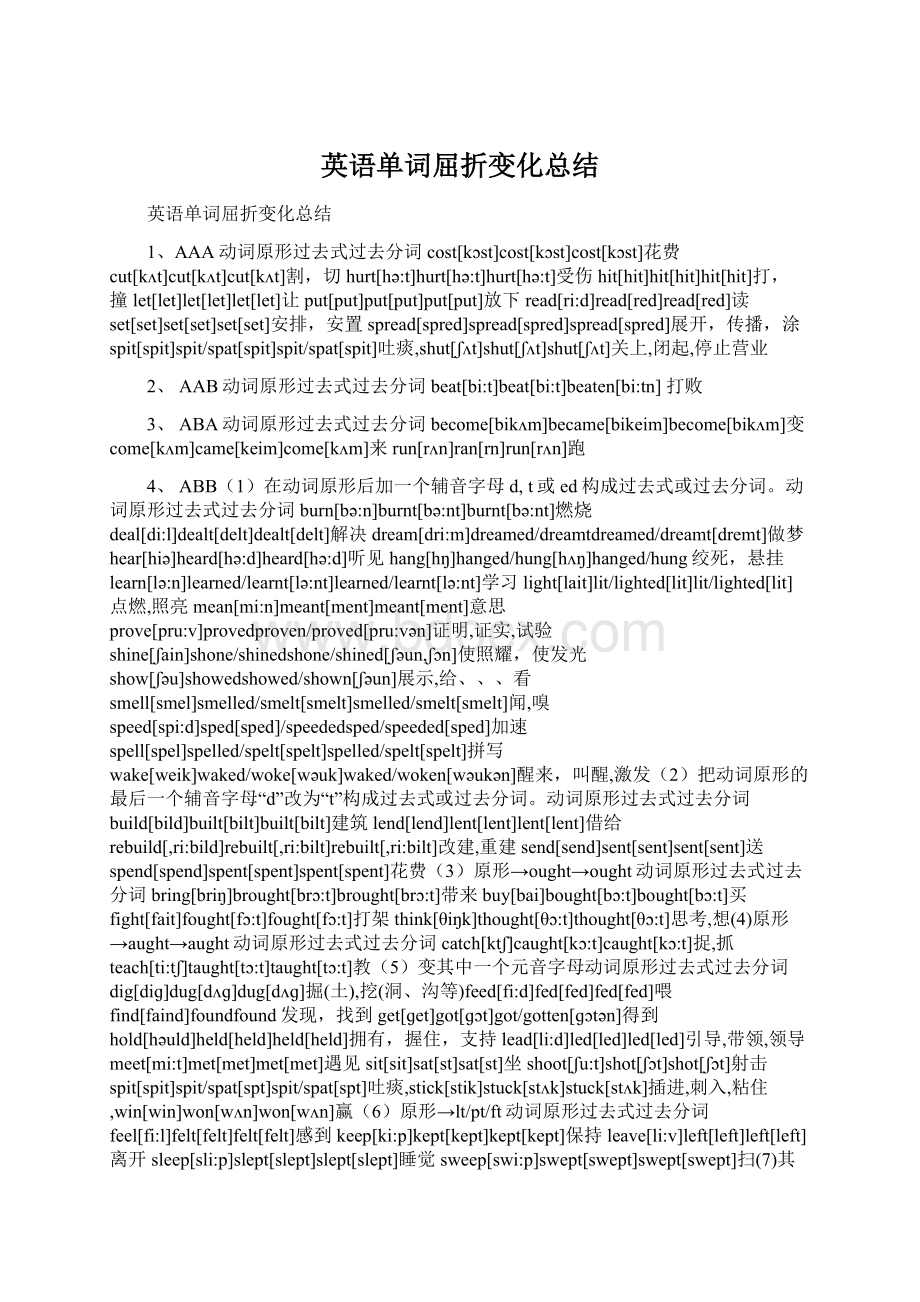英语单词屈折变化总结Word格式.docx
《英语单词屈折变化总结Word格式.docx》由会员分享,可在线阅读,更多相关《英语单词屈折变化总结Word格式.docx(5页珍藏版)》请在冰豆网上搜索。

d]heard[hə:
d]听见hang[hŋ]hanged/hung[hʌŋ]hanged/hung绞死,悬挂learn[lə:
n]learned/learnt[lə:
nt]learned/learnt[lə:
nt]学习light[lait]lit/lighted[lit]lit/lighted[lit]点燃,照亮mean[mi:
n]meant[ment]meant[ment]意思prove[pru:
v]provedproven/proved[pru:
vən]证明,证实,试验shine[ʃain]shone/shinedshone/shined[ʃəun,ʃɔn]使照耀,使发光show[ʃəu]showedshowed/shown[ʃəun]展示,给、、、看smell[smel]smelled/smelt[smelt]smelled/smelt[smelt]闻,嗅speed[spi:
d]sped[sped]/speededsped/speeded[sped]加速spell[spel]spelled/spelt[spelt]spelled/spelt[spelt]拼写wake[weik]waked/woke[wəuk]waked/woken[wəukən]醒来,叫醒,激发
(2)把动词原形的最后一个辅音字母“d”改为“t”构成过去式或过去分词。
动词原形过去式过去分词build[bild]built[bilt]built[bilt]建筑lend[lend]lent[lent]lent[lent]借给rebuild[,ri:
bild]rebuilt[,ri:
bilt]rebuilt[,ri:
bilt]改建,重建send[send]sent[sent]sent[sent]送spend[spend]spent[spent]spent[spent]花费(3)原形→ought→ought动词原形过去式过去分词bring[briŋ]brought[brɔ:
t]brought[brɔ:
t]带来buy[bai]bought[bɔ:
t]bought[bɔ:
t]买fight[fait]fought[fɔ:
t]fought[fɔ:
t]打架think[θiŋk]thought[θɔ:
t]thought[θɔ:
t]思考,想(4)原形→aught→aught动词原形过去式过去分词catch[ktʃ]caught[kɔ:
t]caught[kɔ:
t]捉,抓teach[ti:
tʃ]taught[tɔ:
t]taught[tɔ:
t]教(5)变其中一个元音字母动词原形过去式过去分词dig[diɡ]dug[dʌɡ]dug[dʌɡ]掘(土),挖(洞、沟等)feed[fi:
d]fed[fed]fed[fed]喂find[faind]foundfound发现,找到get[ɡet]got[ɡɔt]got/gotten[ɡɔtən]得到hold[həuld]held[held]held[held]拥有,握住,支持lead[li:
d]led[led]led[led]引导,带领,领导meet[mi:
t]met[met]met[met]遇见sit[sit]sat[st]sat[st]坐shoot[ʃu:
t]shot[ʃɔt]shot[ʃɔt]射击spit[spit]spit/spat[spt]spit/spat[spt]吐痰,stick[stik]stuck[stʌk]stuck[stʌk]插进,刺入,粘住,win[win]won[wʌn]won[wʌn]赢(6)原形→lt/pt/ft动词原形过去式过去分词feel[fi:
l]felt[felt]felt[felt]感到keep[ki:
p]kept[kept]kept[kept]保持leave[li:
v]left[left]left[left]离开sleep[sli:
p]slept[slept]slept[slept]睡觉sweep[swi:
p]swept[swept]swept[swept]扫(7)其它动词原形过去式过去分词lay[lei]laid[leid]laid[leid]下蛋,放置pay[pei]paid[peid]paid[peid]付say[sei]said[sed]said[sed]说stand[stnd]stood[stud]stood[stud]站understandunderstood[,ʌndəstnd]understood[,ʌndəstnd]明白lose[lu:
z]lost[lɔst,lɔ:
st]lost[lɔst,lɔ:
st]失去have[həv]had[hd,həd,əd]had[hd,həd,əd]有make[meik]made[meid]made[meid]制造sell[sel]sold[səuld]sold[səuld]卖tell[tel]told[təuld]told[təuld]告诉retell[,ri:
tel]retold[,ri:
təuld]retold[,ri:
təuld]重讲,重复,复述
5、ABC
(1)原形→过去式→原形+(e)n动词原形过去式过去分词blow[bləu]blew[blu:
]blown吹;
重击drive[draiv]drove[drəuv]driven[drivən]驾驶draw[drɔ:
]drew[dru:
]drawn[drɔ:
n]画画eat[i:
t]ate[et,eit]eaten[i:
tən]吃fall[fɔ:
l]Fell[fel]fallen[fɔ:
lən]落下give[ɡiv]gave[ɡeiv]given[ɡivən]给grow[ɡrəu]grew[ɡru:
]grown[ɡrəun]生长forgive[fəɡiv]forgave[fəɡeiv]forgiven原谅,饶恕know[nəu]knew[nju:
nu:
]known知道mistake[misteik]mistook[mistuk]mistaken弄错;
误解,overeat[əuvəi:
t]overate[,əuvəreit]overeaten(使)吃过量prove[pru:
v]provedproven/proved证明,证实,试验take[teik]took[tuk]taken[teikn,teikən]拿throw[θrəu]threw[θru:
]thrown[θrəun,θrəun]抛,扔ride[raid]rode[rəud]ridden[ridən]骑see[si:
]saw[sɔ:
]seen[si:
n]看见show[ʃəu]showedshowed/shown[ʃəun]展示write[rait]wrote[rəut]written[ritən]写
(2)原形→过去式→过去式+(e)n动词原形过去式过去分词break[breik]broke[brəuk]broken[brəukən]打破choose[tʃu:
z]chose[tʃəuz]chosen[tʃəuzən]选择get[ɡet]got[ɡɔt]got/gotten[ɡɔtən]得到hide[haid]hid[hid]hidden[hidən]隐藏forget[fəɡet]forgot[fəɡɔt]forgotten[fəɡɔtn]忘记freeze[fri:
z]froze[frəuz]frozen[frəuzn]冷冻,结冰,感到严寒speak[spi:
k]spoke[spəuk]spoken[spəukən]说steal[sti:
l]stolestolen[stəulən]偷(3)变单词在重读音节中的元音字母“i”分别为“a”(过去式)和“u”(过去分词)。
[i→a→u]动词原形过去式过去分词begin[biɡin]began[biɡn]begun[biɡʌn]开始drink[driŋk]drank[drŋk]drunk[drʌŋk]喝sing[siŋ]sang[sŋ]sung[sʌŋ]唱sink[siŋk]sank[sŋk]sunk[sʌŋk]下沉,沉没swim[swim]swam[swm]swum[swʌm]游泳ring[riŋ]rang[rŋ]rung[rʌŋ]打电话(4)其它动词原形过去式过去分词be(am,is,are)was/werebeen是bear[bεə]bore[bɔ:
]born/borne[bɔ:
n]负担,忍受do[du:
du:
]did[did]done[dʌn]做fly[flai]flew[flu:
]flown[fləun]飞go[ɡəu]went[went]gone[ɡɔn]去lie[lai]lay[lei]lain[lein]躺wear[wεə]wore[wɔ:
]worn[wɔ:
n]穿tear[wεə]tore[wɔ:
]torn[wɔ:
n]撕动词原形变第三人称单数的规则
1、大多数动词在词尾加“S”在清辅音后发音为[s],在浊辅音及元音后发音为
[z]。
如:
①stop-stops
[s];
make-makes
[s]②read-reads
[z];
play-plays
[z]
2、以辅音字母加“y”结尾的,要先将“y”变为“i”,然后在加“es”读[iz]如:
fly-flies
[z];
carry-carries
[z]study-studies
[z];
worry-worries
3、以“s,x,ch,sh”结尾的,在词尾加“es”,读[iz]如:
teach-teaches[iz];
watch-watches
[iz]
4、以“o”结尾的动词,加“es”,读[z],如:
go-goes
[z]do-does
[z]下面几个动词变为单数时,原词的元音部分的发音发生了较大的变化,请注意记忆。
1、do
[du:
]-does
[dz]
2、say
[sei]-says
[sez]以不发音字母“e”结尾的开音节词,如果尾音是[s],[z]时,加“s”后字母“e”发音,与所加“s”一起读做[iz]。
close-closes
[iz]动词加ing的变化规则
1、一般情况下,直接加ing,如:
cook-cooking
2、以不发音的e结尾,去e加ing,如:
make-making,taste-tasting
3、重读闭音节结尾的,双写末尾的辅音字母,再加ing,如:
run-running,stop-stopping注意:
以y结尾的,直接加ing,不能把y去掉!
!
4、以-ie结尾,先将-ie改成y,再加-ing。
例如:
tying,dying,lying
口诀:
现在进行ing,以e结尾要去e,除去几个特殊词,系住tie-tying死去die-dying要躺下lie-lying,直接ie变成y,
5、重读闭音节结尾的,要双写结尾的辅音字母再加-ing。
以下为常见的需要双写加ing的词。
swim-swimmingrun-runningput-puttingsit-sittingbegin-beginningplan-planningcut-cuttingget-gettingshop-shoppingchat-chattingstop-stoppingregret-regrettingdig-diggingprefer-preferringtrek-trekking但是:
listen-listening因为listen前面重读,ten部分不是重读音节,所以不能双写。
而eat-eating因为eat辅音字母t前面有两个元音字母,故不能双写!
write-writing不双写,不要受written干扰!
形容词副词比较级最高级变化形式归纳规则变化◇单音节以及少数双音节的词后面直接加-er,y,-er,r,-st原级比较级最高级nicenicernicestfinefinerfinestlargelargerlargest◇“以辅音字母+y”结尾的词改y为i,再加-er,er,-est原级比较级最高级slimslimmerslimmestthinthinnerthinnesthothotterhottestbigbiggerbiggest特别提醒:
new,few,slow,clean等词含有字母组合,且发的是长元音,不用双写。
◇大部分双音节词和多音节的词(即音标中含有三个或三个以上元音音素的词),要在前面加more,most原级比较级最高级beautifulmorebeautifulmostbeautifulimportantmoreimportantmostimportantinterestingmoreinterestingmostinterestingexpensivemoreexpensivemostexpensivepopularmorepopularmostpopular特别提醒:
以形容前缀un构成的三音节形容词不适合上述情况,unhappy----unhappier----unhappiest,untidy----untidier----untidiest◇以形容词+ly构成的副词要在前面加more,most原级比较级最高级slowlymoreslowlymostslowlyquicklymorequicklymostquicklyangrilymoreangrilymostangrilysoftlymoresoftlymostsoftlynoisilymorenoisilymostnoisily特别提醒:
early--earlier----earliest◇由-ing分词和-ed分词形式的形容词加more或most来表示它们的比较级和最高级。
原级比较级最高级interestingmoreinterestingmostinterestingexcitedmoreexcitedmostexcitingtiredmoretiredmosttiredboringmoreboringmostboring不规则变化原级比较级最高级原级比较级最高级good/wellbetterbestlittlelessleastbad/badly/illworseworstfarfarther/furtherfarthest/furthestmany/muchmoremostoldolder/elderoldest/eldest特别提醒:
◇further不仅可以指“距离更远”,还可指“程度更深”。
furthereducation(继续教育)
furtherinformation(进一步的信息)
furtherstudy(进修)
◇elder仅用于同辈之间的排行,如:
eldersister(姐姐)
elderbrother(哥哥)◇less作为“更少”仅用来修饰不可数名词,修饰可数名词表示“更少”要用fewer。
◇少数单音节词前面加more,most构成比较级和最高级,这类形容词一般为表语形容词和由过去分词变成的形容词。
afraid--moreafraid,mostafraidtired--moretired,mosttiredfond---morefond,mostfondglad---moreglad,mostgladbored--morebored,mostboredpleased----morepleased,mostpleased◇下列形容词和副词的比较级和最高级有两种形式,即:
既可加-er/-est也可加more/mostcruel,strict,often,friendly,clever◇下列形容词和副词没有比较级和最高级(即表示“最高程度”或“绝对状态”的形容词和副词没有比较级和最高级)empty,wrong,perfect,unique,extreme,excellent,favourite,true,right,correct,extremely、、、-ly词尾
1、有些词后面加上-ly构成形容词:
friendly,motherly,likely
2、一般地,形容词后面加上-ly变成该形容词的副词:
beautifuldeadly致命的,2)有些词的后面加上-ly变成另一个副词,如:
hard辛苦的nearly几乎close靠近的possibly
4、其他以不发音的e结尾的形容词,直接加-ly变成副词(e不能去掉),如:
fortunatetruly,wholeangrily-y结尾的单词
1、-y结尾的动词,其现在分词形式为直接加-ing,如:
studystudied,其第三人称单数形式也需要把-y改为i再加-es,如:
studydestroyed,其第三人称单数形式为直接加-s,如:
destroypuppies
5、以“元音字母+y”结尾的单数可数名词,其复数形式为直接加-s,如:
boystopping/stopped,forgetwrotewriting(不双写t)